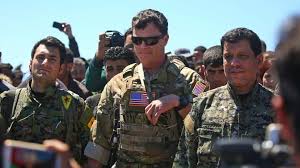Fierce clashes erupted today between the Suqur a-Shammal faction and fighters from Deir Ezzor (Jaysh & Ahrar a-Sharqiya) in Ras al-Ayn after a Suqur fighter kidnapped a woman originally from Deir Ezzor to rape her. Ras al-Ayn was captured from the SDF in the last Turkish invasion of NE Syria and is now ruled by several Turkish-backed rebel factions.
These types of kidnappings are common in areas under the control of the Turkish-backed factions. Victims are both Kurdish and Arab women. Often, the women that were kidnapped end up marrying their rapists to “salvage their honor” after they’ve been violated.
An Arab resident that frequently provided information to IKHRW on the situation on the ground, was arrested and tortured by the Sultan Murad faction in Efrin on completely baseless charges. He reported that in the black site where he was held, Sultan Murad fighters would enter the cells of the women at night.
After the Turkish-led invasion began, these Turkish-backed militias rapidly gained notoriety after their members were filmed in a series of videos that showed them chanting extremist slogans and carrying out field executions. One US official labeled them “thugs and bandits.”

When Turkey first created the framework of its Syrian factions, before the Euphrates Shield Operation, the salaries offered to fighters were extraordinarily high: $300 per month, paid in Turkish lira. Over time, salaries have declined. By the beginning of 2019, salaries had been cut to about $100 distributed every seven to eight weeks. That rate, of about $50 per month, is insufficient to cover even basic necessities, so fighters commonly have to rely on taking loans, family support, and criminal activities such as looting in order to make ends meet.
The fighters supplement their meager wages through various schemes. Control of permanent checkpoints between SNA-held areas and rebel-held areas, regime areas, and SDF-held territory, is highly prized as a source of toll revenue—leading to numerous episodes of factional fighting.
Cars passing through these checkpoints have to pay the guards, either in cash or by other means. Those transporting medicine, for example, pay the fighters by giving them a cut of the goods they’re moving—typically, stimulant pills like Tramadol.
Other profit-making schemes abound. In addition to the established checkpoints, fighters also set up temporary checkpoints and extort cash from passersby. SNA commanders also demand protection money from businesses, “such as car dealerships, owners of restaurants, gold sellers, owners of factories. It’s just like a mafia,” said a SNA-officer through social media.
Some groups also kidnap civilians, usually wealthier individuals or ones with relatives abroad, demanding ransom payments.
Dijle, a Kurdish woman still living in Efrîn, told me she felt lucky. Though arrested shortly after the Turkish-backed takeover of the area by the Sultan Murad Brigade, “I was barely touched, as opposed to other women held with me,” she said. “Women as old at seventy were beaten and raped.” She attributes her better fortune to being a known opponent of the PYD, the political party associated with the Kurdish YPG militia, which had previously ruled the region. Even so, Dijle was detained for a month
Eventually released, she returned to an Efrîn she found transformed—and heavily looted. “Now 90 percent of the Kurdish women are wearing the hijab, afraid of being harassed. I was harassed and threatened many times. I still keep the hijab off in the city, but in the countryside, where the situation is worse, I wear it,” she reported.
Dijle reported that “children of the Arab fighters told me to my face things like, ‘You are whores, we hope you go to hell’ and ‘We will kill all the Kurds.’” She paused to reflect: “Imagine what hatred they teach them at home for them to be talking like this?”






